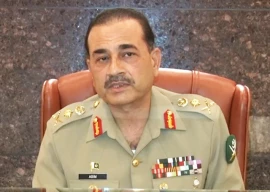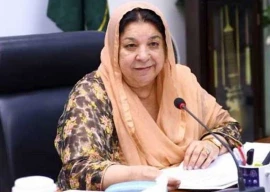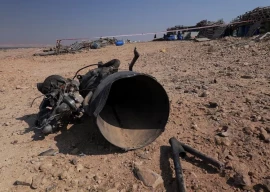ISLAMABAD: Weak institutions, poor governance, corruption, hostility, mistrust and cartels contribute towards food insecurity in conflict-hit areas of South Asia.
This was said by Dr Bishnu Raj Upreti, South Asia Regional Coordinator, National Centre of Competence in Research (NCCR) North South, on the last day of a three-day conference organised by Sustainable Development Policy Institute. He was speaking at a session titled “The Relationship between Food Insecurity, Poverty, Militancy and Conflict”.
Upreti added that security and operational conditions at the local levels have heavily influenced food insecurity. Diversion of resources to security and political expenditure weakened service delivery mechanisms and added fuel to food insecurity, he said.
The ten most food insecure districts in Pakistan include Dera Bugti, Musa Khel, Upper Dir, North Waziristan, South Waziristan, Orakzai, Mohmand and Panjgur, according to a 2009 report by the Financial Inclusion Programme (FIP).
Dr Abid Qayyum Suleri, Executive Director SDPI, said that a paradigm shift is needed to overcome the food insecurity crisis.
He lamented that food insecurity in Pakistan had increased from 37 per cent to 48.6 per cent over the last six years. He said that militancy in the country, especially in K-P, Fata and Balochistan further worsened the situation.
The energy crisis in the country resulted in closure of industries and reduction in jobs, which increased the sense of deprivation and helplessness among the people, he added.
Suleri said that price hike during 2007-2008 was due to international food crisis, domestic shortfall, and increase in support price. Then floods in 2010 worsened the situation.
Some of the young people living in vulnerable groups in food-insecure areas chose to join illegal organisations for jobs. Others were forced, he said, adding that the increase in incidents of thefts and robberies was alarming.
“Kidnapping of resourceful people [in the food insecure areas] is common and on the rise. Many businessmen with resources and capacity to employ others either fled the area or were killed,” he added.
Individual cases of relative hunger, when turn into collective deprivation and gets an identity, whether creed, gender, class, or nationality always leads to class conflict and ultimately to violence, he said.
The FIP report indicates that 48.5 per cent of the total population in 76 out of 131 districts in Pakistan is food insecure. The population in another 26 districts is on the borderline and extremely vulnerable to external interventions.
Province-wise, 56.2 per cent of the population in Khyber-Pakhtunkhwa, 38.5 per cent in Punjab, 44.3 per cent in Sindh, 61.2 per cent in Balochistan, 67.7 per cent in Fata, 46.9 in Azad Jammu and Kashmir and 52.4 per cent of the population in Gilgit-Baltistan is facing food insecurity. Islamabad has the lowest amount of food insecurity, with 23.6 per cent of its population living in fear of hunger or starvation.
Former Interior Secretary Kamal Shah, while analysing the report, said, “Many people would easily recall that these districts are perceived as the ‘axis of evil’ within Pakistan. However it is an established fact that food insecurity leads to violence and conflict.”
Poverty was endemic throughout the region, whether measured in terms of calories or the Human Development Index, Shah said. While northern Punjab and urban Sindh boast higher standards of living than the rest of the country, there is little to distinguish between K-P, Balochistan, rural Sindh, southern Punjab and Fata, he said.
He emphasized that the international community should start investing in developing the social and human capital of people suffering from chronic food insecurity in the country.
“Perceiving hunger as a national, regional, and global security threat, UN agencies, bilateral donors, and international financial institutes should re-align their strategy in Pakistan to turn the pain of hunger into opportunity for social transformation, better awareness about human rights, women’s empowerment, girls’ education and adult education,” he said.
Published in The Express Tribune, December 24th, 2010.

















1713272658-0/Copenhagen-fire-(1)1713272658-0-270x192.webp)


1713268762-0/Netflix-(3)1713268762-0-270x192.webp)






















COMMENTS
Comments are moderated and generally will be posted if they are on-topic and not abusive.
For more information, please see our Comments FAQ